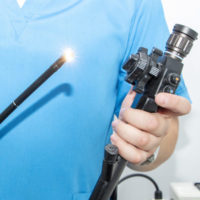Duodenoscope Transmitted Infections Put Patients’ Health at Risk
October 11, 2019 Duodenoscopes are medical devices used during endoscopic retrograde cholangiopancreatography (ERCP) to help health care providers diagnose and treat serious conditions and diseases, such as cancer or gallstones in the pancreas or bile duct. These flexible, lighted tubes are threaded into the top of the small intestine via the mouth, throat, and stomach. They are effective at detecting serious medical conditions, and are much less invasive than traditional surgery, but they can be difficult to sterilize thanks to a design flaw, which can put patients at an increased risk for infection. The percentage of duodenoscopes that have transmitted infections is quite small, but the Food and Drug Administration (FDA) is taking proactive steps to address the issue and minimize patient exposure.
Duodenoscopes are medical devices used during endoscopic retrograde cholangiopancreatography (ERCP) to help health care providers diagnose and treat serious conditions and diseases, such as cancer or gallstones in the pancreas or bile duct. These flexible, lighted tubes are threaded into the top of the small intestine via the mouth, throat, and stomach. They are effective at detecting serious medical conditions, and are much less invasive than traditional surgery, but they can be difficult to sterilize thanks to a design flaw, which can put patients at an increased risk for infection. The percentage of duodenoscopes that have transmitted infections is quite small, but the Food and Drug Administration (FDA) is taking proactive steps to address the issue and minimize patient exposure.
If a duodenoscope is not properly cleaned and sterilized between uses, tissue or liquid from one patient can be transmitted to another patient. In 2013, the Centers for Disease Control and Prevention (CDC) notified the FDA about the possible connection between multi-drug resistant bacteria and duodenoscopes, even though users were following the proper cleaning and sterilization protocols. The FDA has reached out to state and local health departments, public health systems, medical device manufacturers, health care facilities, and other organizations to better understand the causes and common risk factors for transmission of infections.
Steps to Prevent Patient Exposure
- October 2015: The FDA required duodenoscope manufacturers in the United States to conduct postmarket surveillance studies to determine how the devices are reprocessed in real-world settings, and how that impacts the transmission of infections.
- February 2018: The FDA, CDC, and the American Society for Microbiology (ASM) developed and released voluntary standardized protocols for duodenoscope surveillance sampling and culturing. These updated protocols ensure that a facility is following the appropriate endoscope reprocessing procedures.
- March 2018: The FDA sent warning letters to Fujifilm Medical Systems USA, Inc, Olympus Medical Systems Corporation, and Pentax of America for failure to provide enough data to address the postmarket surveillance requirements under the Federal Food, Drug, and Cosmetic Act. All three companies submitted plans that explain how they will collect samples and enroll new sites, along with other study milestones.
- December 2018: The FDA issued a Safety Communication that provided interim results from the postmarket surveillance studies. The results indicated a higher rate of contamination after duodenoscope reprocessing than expected.
- April 2019: The FDA issued a Safety Communication to provide results from the postmarket surveillance study of duodenoscopes used in ERCP since the December 2018 Safety Communication.
- August 2019: The FDA provided an update on the postmarket surveillance study results since April 2019. This included additional recommendations and updates, including:
– Health care facilities should begin using duodenoscopes that have innovative designs and do not need reprocessing.
– Alert health care facilities that they should avoid using adenosine triphosphate (ATP) strips when cleaning duodenoscopes.
– Issue new orders to duodenoscope manufacturers with disposable endcaps to collect information and ensure that the new designs are reducing the contamination rate.
Baltimore Medical Malpractice Lawyers at LeViness, Tolzman & Hamilton Represent Victims of Contaminated Duodenoscopes
If you developed an infection from a duodenoscope that was not properly sterilized, contact the Baltimore medical malpractice lawyers at LeViness, Tolzman & Hamilton. If your health care provider did not follow the proper sterilization protocol, it puts patients at risk for serious infections. We will obtain the maximum financial compensation you deserve and ensure that your legal rights are always protected. To schedule a free, confidential consultation, call us today at 800-547-4LAW (4529) or contact us online.
Our offices are located in Baltimore, Columbia, Glen Burnie, and Towson, allowing us to represent medical malpractice victims in Maryland, including those in Anne Arundel County, Baltimore County, Carroll County, Harford County, Howard County, Montgomery County, Maryland’s Western Counties, Prince George’s County, Queen Anne’s County, Southern Maryland, and the Eastern Shore, as well as the communities of Catonsville, Essex, Halethorpe, Middle River, Rosedale, Gwynn Oak, Brooklandville, Dundalk, Pikesville, Nottingham, Windsor Mill, Lutherville, Timonium, Sparrows Point, Ridgewood, and Elkridge.






